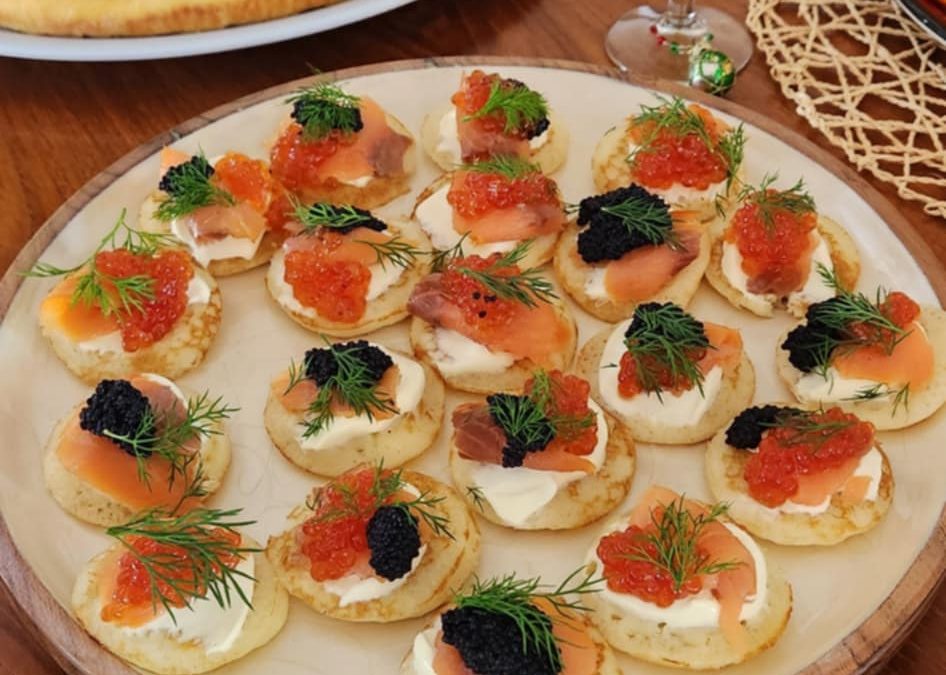
Surviving Christmas Food
December 20, 2024
Feeling Pressured to Take Ozempic?
March 9, 2025Feeling “Fat” After Christmas?

Indulging in a festive holiday dish of pancakes, crème fraîche, salmon, and caviar—embracing balance and mindful eating after the Christmas season, without guilt or shame.
Feeling “Fat” After Christmas? Let’s Talk About It.
Ah, the post-holiday slump. The decorations are coming down, the last crumbs of gingerbread have been devoured, and suddenly, your jeans feel a little… snugger? Before you panic-Google “detox plans” (please don’t), let’s take a deep breath and unpack what’s really going on.
As a clinical psychologist and eating disorder therapist in Melbourne, I know how easy it is to spiral into body image worries after a season of indulgence. But here’s the thing: feeling bloated, sluggish, or out of routine doesn’t mean you’ve “ruined” anything. Your body is not a whiteboard that needs erasing every January.
Why You Feel “Different” After the Holidays (and Why That’s Normal)
1. Your Routine Has Been Thrown Out the Window
Between family gatherings, travel, and lazy holiday mornings, your usual habits likely took a backseat. Maybe you skipped workouts, ate at odd times, or swapped your usual meals for a steady diet of cheese boards and pavlova (no judgment, I’m right there with you). When routines shift, it can make you feel disconnected from your body, but that’s temporary.
2. You’ve Been Eating More Rich, Salty, or Sugary Foods
Christmas food is delicious for a reason, it’s often richer and higher in salt and sugar than your day-to-day meals, which isn’t a bad thing. This can cause temporary water retention and bloating, but it’s not the same as actual weight gain. Your body will rebalance itself once you return to your normal habits.
3. Alcohol = Bloat City
From mimosas at brunch to a celebratory glass (or three) of wine, alcohol can mess with your digestion and leave you feeling puffy and dehydrated. Again, this is temporary. Hydration and regular meals will help you feel better fast.
4. Social Pressure is Real
Holiday conversations tend to be filled with comments about food and weight, with relatives joking about “holiday kilos,” friends talking about starting diets, or even your own inner voice getting loud with self-criticism and comparisons to others. These messages can make it harder to feel at peace with your body, even when nothing has actually changed.
But Has Your Body Actually Changed? (Spoiler: Probably Not, or At Least Not as Much as You Think)
Most post-holiday weight fluctuations come from temporary factors like water retention, food volume, and digestion, not actual fat gain. Drastic body composition changes require consistent, long-term habits, not a few weeks of Christmas feasting.
And let’s not forget: guilt can seriously mess with perception. When we feel bad about eating, we become hyper-aware of our bodies and start seeing “changes” that aren’t even there. The mirror is not a scientific instrument, my friend.
How to Feel Better Without Jumping on a Crash Diet
1. Get Back to a Routine (But Make It Gentle)
No need to overhaul your life, just ease back into regular meals, balanced nutrition, and movement that feels good. No punishment required.
2. Hydrate, Hydrate, Hydrate
Water helps with digestion, reduces bloating, and keeps you feeling good. Aim to drink consistently throughout the day.
3. Move in Ways That Feel Good
Forget “burning off” holiday food—your body doesn’t work that way. Instead, focus on movement that helps you feel energized, whether it’s walking, yoga, stretching, dancing around your kitchen, or my personal favorite: playing with a dog.
4. Challenge Negative Thoughts
Notice when self-critical thoughts creep in and ask yourself: Is this really true? Probably not. Your worth is not tied to what you ate over the holidays.
5. Focus on Well-Being, Not Weight
Shift your attention from how your body looks to how it feels. What choices make you feel good, energized, and calm? Focus on those.
Let’s Reframe the Holiday Experience
Instead of seeing the holidays as a time of “losing control,” what if we reframed them as a time of joy, connection, and celebration?
- Appreciate the memories: The laughter, the traditions, the special meals with loved ones, those matter way more than a few extra snacks.
- Embrace flexibility: Life is about seasons, and a few weeks of different eating patterns won’t define your health.
- Let go of guilt: Enjoying food is not a crime. Your body knows how to find balance again.
Moving Forward with Confidence
As the holiday season fades and the new year kicks off, give yourself permission to ease back into normalcy without self-punishment. Your body is resilient, and one season of indulgence won’t erase all the things that make you healthy and whole.
If you find yourself struggling with body image or feeling stuck in food guilt, you don’t have to navigate it alone. As an eating disorder psychologist in Melbourne, I help people rebuild their relationship with food and their bodies in a way that feels sustainable and freeing.
If you’re looking for support with body image, eating disorders, or food-related anxiety, reach out!



